A portable microwave is now becoming a crucial gadget for household use as well as an important accessory for offices, cars, trucks, and picnics. There is a huge variety of ovens that are now available in the market.
Furthermore, we classify ovens on the basis of their sizes as mini portable size ovens and full-sized ovens. Mostly we spend less than 100 dollars on small microwaves. On the other hand, the price of a full-sized oven is more than five times that of a mini oven.
There is a common misconception in people that spending more on an oven means more power and convenience features. Unluckily it is wrong. You will easily get all the innovative features in a budget-friendly range.
# | Image | Product | Rating | View |
1 | Toshiba EM131A5C-BS Microwave Oven | |||
2 |  | Car Food Warmer Portable Oven | ||
3 | Toshiba Microwave ECO Mode | |||
4 |  | Commercial Chef Microwaves With Child Lock Protection | ||
5 |  | Hot Logic Mini Portable Stove | ||
6 |  | Toshiba ML Smart Countertop Microwave | ||
7 |  | Portable Food Warmer Personal Microwaves | ||
8 |  | Toshiba EM131A5C-SS Microwave Oven with Smart Sensor | ||
9 |  | BLACK+DECKER With Push Button Door | ||
10 | Toshiba Countertop Microwave Oven with Smart Sensor | |||
11 |  | Nostalgia Programed Cooking Oven | ||
12 |  | Portable Oven For Home Kitchen |
The main trick to getting a perfect device according to your needs is that you must clearly know your requirements before making any decision.
For instance, if you are single and looking for an oven then there is no need to pay for a full-sized oven. Ultimately there is a huge range of personal microwaves then you must select from one of them.
In this era, every person is so strictly engaged with their daily routine that they do not find any spare time to research before buying a mini portable microwave.
For the convenience of people, our team did detailed research and shortlisted top-ranked portable microwaves so you can easily select one for you from the list.
Table of Contents
Toshiba EM131A5C-BS Microwave Oven:
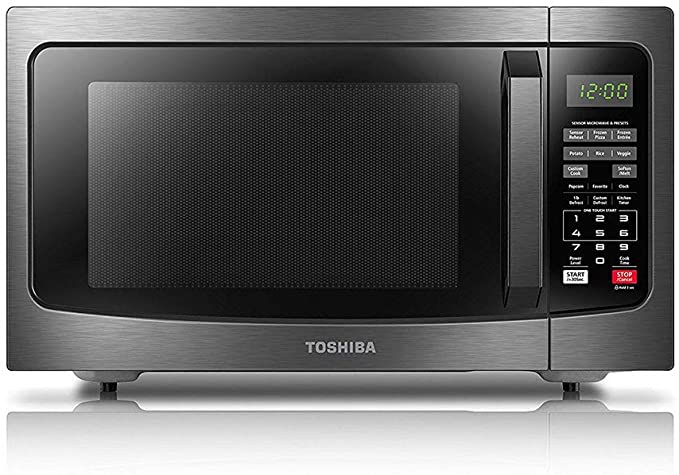
Toshiba microwave is an important and unique addition to the electronic industry. Furthermore, it comprises a height of only 0.9 cubic feet of space. Ultimately it will help you out during cooking.
Furthermore, when we talk about its looks it comes with a super sleek and stylish look. The product comes with black stainless steel finishing that attracts every person’s eye.
Ultimately its look makes it modern and stylish. As this microwave has its unique place in the queue of portable microwaves, its performance is up to the mark.
The main reason behind its flawless performance is its 10.6 inches turntable. This turntable ensures that the provided food will be cooked evenly and users enjoy fresh and yummiest food.
Moreover, Toshiba microwaves are perfect for kitchens that have very small spaces. As it adjusted in limited space as well. You can estimate its portability with this phrase, as this product can be adjusted in cars as well. This product also has the title of mini microwave among all the ovens available on the market.
Now moving towards its power consumption, this best oven runs over 900 watts along with 10 power settings. Ultimately now it is easier for you to make a variety of foods by using this device. Unlike other machines, this oven will not alter the taste and composition of the provided food.
In Short, you can find all the innovative features in his product. Like a defrost function, a digital control panel with LED.
User Experience:
This door handle is amazing! I love how it is so much better than the press button other brands have. It is so simple and effective and I can’t believe how well it works.
Features:
- Single functions to operate every sort of dish.
- Power saving mode to save electricity
- Built-in LED light
- Advanced defrost function and digital control panel
Car Food Warmer Portable Oven:
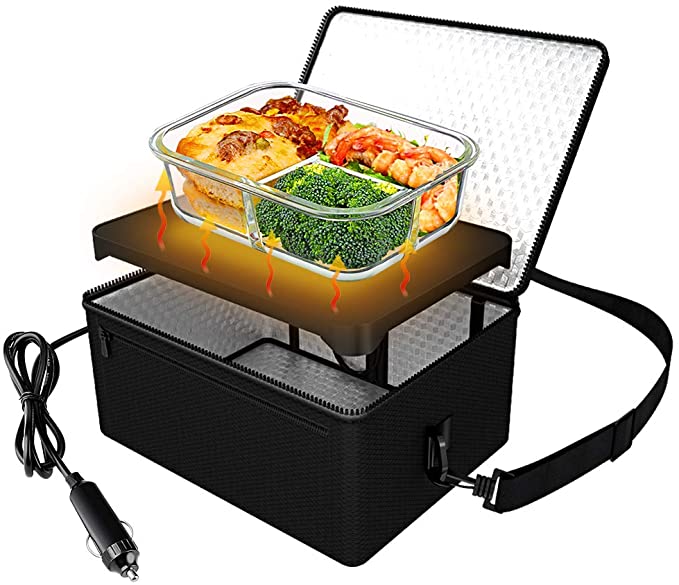
This goes mini microwave oven is no doubt the best countertop microwave. This food warmer is perfect to give flawless results. Surprisingly it can be excellent for warming cooked food. It is not only warm food properly, but you can also cook healthy food by using this product.
If you are going outside you have to choose only your favorite fresh cooked or uncooked meals, keep them in the oven and start your journey. On the way, you can properly warm the cooked food and if you have some uncooked stuff you can properly cook them by using it.
We are damn sure you will be surprised to notice its performance. There are some precautions to using this food warmer during the journey. By following the precaution you will enjoy its flawless performance.
According to expertise for the proper performance do use it on a 24 volts truck, you can attach it with a 12 volts car. Attaching it with a higher voltage will cause overheating problems.
How can we forget to talk about its automatic temperature control system? In simple words, there is no need to monitor while using this warmer. While this oven is attached with a proper power supply then it will not overheat.
Ultimately there is no need to stick in front of this device while working on it. It is a perfect result to cook uncooked frozen food and reheat cooked food without drying and burning. To enjoy flavorful and fresh food you can surely buy it.
As we mentioned earlier it is very small and portable. So everyone can easily carry it with them anywhere they are going. There are three easier methods to carry it. First, simply grasp it in your hands, keep it in any bag and hold it with the help of your shoulder, or keep it in your office and carry it with the help of your back.
As you can use it as a car microwave oven, you need a flat and heat resistant container of the size 9 inches wide and 6.75 inches in length, and 3.5 inches in height.
User Experience:
If you are on a budget or just like home-cooked meals or leftovers, this is the perfect product. I was shocked it only took about an hour for a frozen dinner to heat up. This thing pays for itself! Save that lunch money!
Features:
- It is designed with on-the-go mini microwaves principal
- Special functions to reheat and cook foods.
- Automatic temperature controller.
- Give flawless performance with a 12-volt power supply.
Toshiba Microwave ECO Mode:
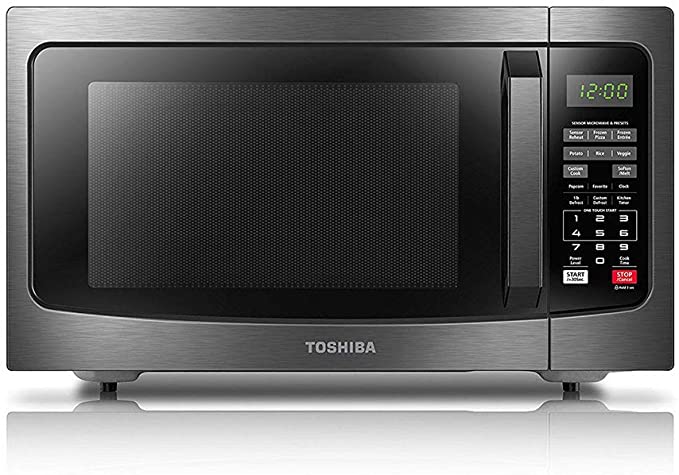
Toshiba is a well-known brand for making portable or full-sized microwaves. This brand is well known for its superb and flawless work. So this Toshiba microwave is also famous for its portability.
Let’s start the review with its design. As far as we talk about its design, this oven comes with a stylish black stainless steel design.
Additionally, its outer body comprises shock-resistant material. Ultimately if it slips from anywhere it is capable of absorbing shock and avoiding breakage. It will tend to minimize the harm and breakage.
Ultimately it is very durable and versatile. Besides all the features the main and important feature is long working life.
Now it’s time to discuss its power consumption and voltages. For the perfect performance, the recommended range of voltage is 120 volts.
Additionally as far as the power is concerned 60 Hz is more than enough for proper working. Technically the input power of microwaves is 1350 watts, resultantly the rated output power of microwaves is 900 watts.
The interesting thing about this best microwave 2021 is that there is no need to program it before use. It is pre-installed on the menu for 6 different popular foods. Generally, these foods are popcorn, pizza, potatoes, rice, and many more.
Furthermore, it gives excellent and equal performance for both cooked and uncooked frozen food. To give heat even on every side of the food there is a movable disk. That moves uniformly without any blockage.
Unlike other complex ovens, these Toshiba microwaves work with a single touch. In short, this product is perfect for beginners and kids as well who have no idea how to operate machines.
The optimum limit to work constantly without any break is 6 minutes. In simple words, it can work consecutively for six minutes without any pause with full power.
This portable microwave comes with many innovative features that are beneficial for cooking. Firstly it comes with a power-saving eco mode to minimize power or electricity loss. Secondly, there is the sound of on and off so no need to stand in front of it. To make it safer there is also a child safety lock.
As we talk about additional accessories or additional advanced features then first of all it is impossible to skip its bright and digital display. Secondly, there is an easy-to-read control panel for easier sight.
Furthermore, there is a 10.6 inches glass turntable making it perfect for large size plates. There is also an additional option of a buzzer for 3-5 seconds. You can also mute it if it disturbs you.
User Experience:
I’m so glad I bought this microwave oven! It’s been nearly two years now and it’s still going strong. I highly recommend it to anyone looking for a reliable and long-lasting microwave oven.
Features:
- Stylish and sleek black stainless body
- There is a power-saving mode to avoid power dissipation
- Advanced ECO mode
- Work consecutively for six hours.
- Child safety lock to make it safer for the kitchen.
SHARP Black Carousel With Cubic Foot:
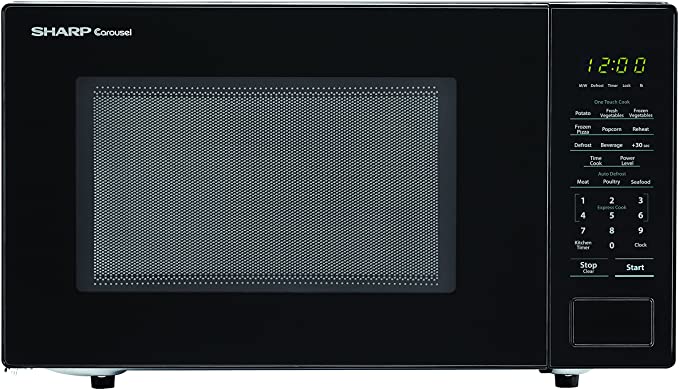
Sharp black is one the best and most excellent microwave ovens that are available in the market in terms of their working or look in the same way. So if you’re aesthetic at the same time you love to have flawless results in cooking.
We highly recommend you to go and pick SHARP Black carousel microwaves for your kitchen.
Without any further delay, it is time to move on to the honest reviews about these top portable microwaves that are getting fame day by day.
First of all, have a look at its size. As far as we discussed the size, it is designed with 1.1 Cu feet. This size is ideal to keep in your kitchen. This ideal product is simply awesome and versatile.
The most important part of any warmer is the turntable. When we talk about a turntable then it should be understood that we are talking about the size and material.
So this product comes with an 11.2 inches glass carousel turntable. Generally, this is ideal as it is not so big nor too small. You can easily place medium to large size plates inside it.
When you use the mentioned size container while using this there will be no issue. Furthermore, it is not for oversized containers
For easier working and avoiding complexity, there is a touch panel. You can easily touch and adjust the timing without any complexity. Furthermore, there is no need to install any program on it. When it comes to pre-installed programs that are needed to operate it.
User Experience:
I’m so glad I upgraded to this newer model of microwave. It cooks evenly and runs extremely quietly. My old unit used to run so loudly compared to this one. The programming is easy with 2, or 3 minutes.
Features:
- Start instantly within 30 seconds due to its automatic controller.
- There are 10 power cooking levels with 1000 watts.
- It comes with unique features of a child safety lock, green LED display, and timer as well.
- Power controller to minimize power loss.
Commercial Chef Microwaves With Child Lock Protection:
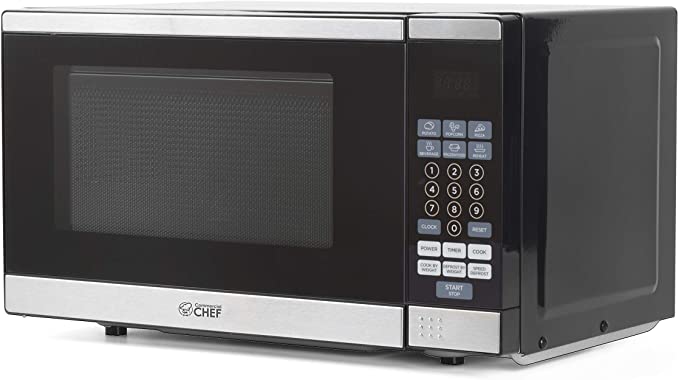
If you are in search of a portable microwave for camping then no need to search anymore. Curious to know why? We are here to tell you. These commercial chef microwaves have all the features and functions that will help you out when you are camping. Let’s move to know about its features and reviews.
Let’s start the review by discussing the power level of the product. 10 power cooking levels prove beneficial for reheating the various types of foods. Furthermore, you can also have cooking flexibility.
Camping gives you fun when you have a variety of foods. Ultimately this top oven tends to provide flawless heating and cooking.
For the reheating and cooking of various types of food, there are 16 convenient cook settings. Ultimately you can enjoy popcorn, baked potatoes, pizzas, etc.
it gives equal results on frozen food as well. Its turntable is 9.5 inches in size. So you can only heat containers of small to medium size in it.
With its digital featuring clock feature you now simply adjust the time according to your food and leave it. It will beep and give you notifications that your food is perfectly heated now.
Additionally, keeping it in your kitchen will not harm the safety of your home and children. As it comes with child lock functions.
User Experience:
I absolutely love my new microwave! I’ve never had a microwave that was so easy to clean and move around. It doesn’t take up a lot of space, which is great for my small kitchen. My largest plates can fit inside of it with no problem. The door works great, the buttons work, and the light works.
Features:
- Made with stainless steel material
- It weighs only 23.1 pounds.
- 10 cooking power modes to give flexibility in cooking.
- There is a special control system to cook and reheat different types of foods.
Toshiba ML Smart Countertop Microwave:
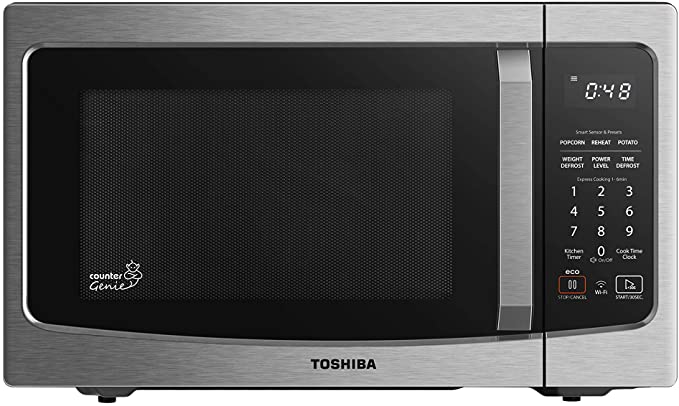
Now it’s time to have a quick look at the detailed review of the Toshiba ML portable microwave for cars. The main importance of this product is its hand-free operation. As it comes with Alexa that is an echo device.
By using this feature you can give commands by using your voice. Furthermore, it comes with a versatile preset menu that includes 23 popular foods.
Additionally, there is a built-in humidity sensor. Ultimately it helps you out during cooking. This sensor adjusts humidity so that your food cooks or heats properly without drying and burning. There is also a function to minimize energy loss.
User Experience:
If you’re looking for an air fryer microwave that can do it all, this is the one for you! It can air fry food to crisp perfection, bake bagels to a light brown, and also be used as a regular microwave to warm up food. This microwave is large inside and the glass turn table is also large, so it can accommodate a large food container. It also fits 12-inch pizzas nicely. The black stainless steel with LED lights looks really nice and is easy to clean.
Features:
- It comes with an integrated Alexa echo device
- Built-in humidity controller
- Proper sound system, to indicate it is an on-off function.
Commercial Chef Top Microwave Oven:
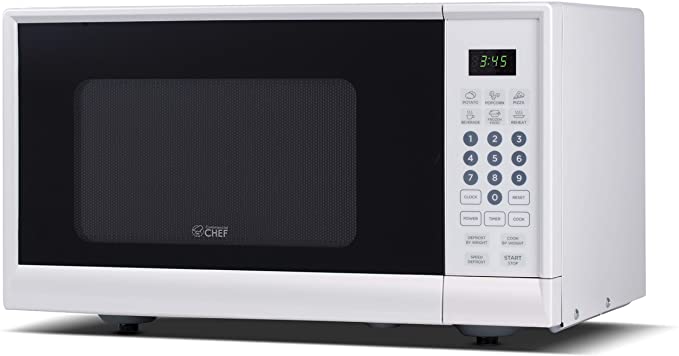
We have already reviewed one of the models of a commercial chef. This model is the latest and somehow more advanced than the previous one.
Additionally, when we compared both products both models are super in their place. It is up to your requirements which model you will select.
Moving towards its functions. The first and most crucial part is its push button. It is super soft and firm. When you push the button the door will open. You do not need to apply much force to it.
Furthermore, there is a touch control for snappier and easier use in this portable microwave.
Moreover, there are 10 cooking power levels to allow you tremendous flexibility in food with very little time and effort at the same time. You can use it as a portable microwave for truck drivers as well.
Additionally, you can also enjoy six one-touch snappy cook menu buttons. You can also reheat every sort of food in it.
User Experience:
We absolutely love our new countertop microwave! It’s such a great size and it was an amazing price. It’s really simple to use which is exactly what we wanted. We didn’t want anything fancy, just something sleek and straightforward. So far it’s been great and we’ve been really happy with it!
Features:
- Easier to operate due to its panel
- Built-in green LED and clear display
- There is a digital clock and timer.
- 10 cooking powerless with six one-touch quick cook menu
Portable Food Warmer Personal Microwaves:
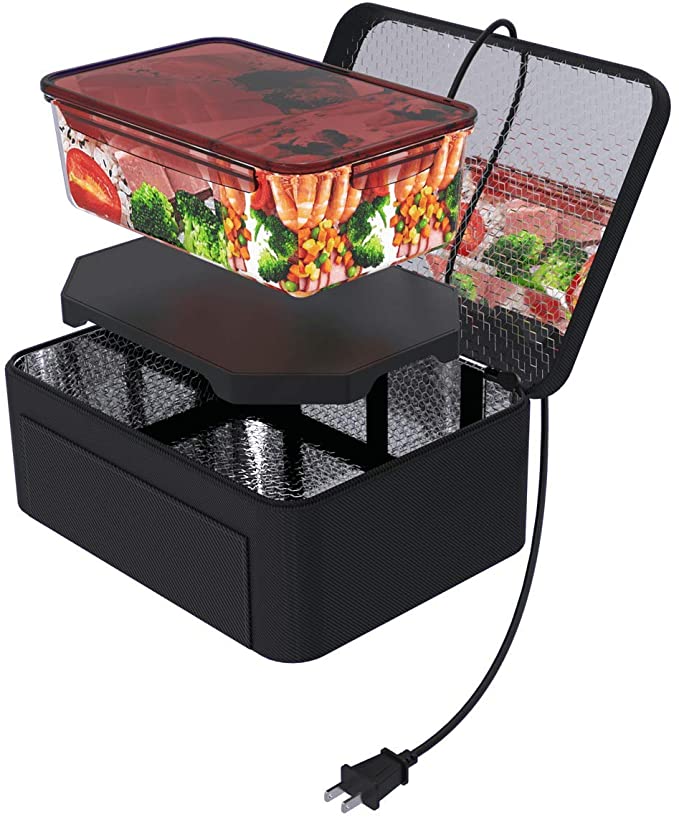
Most of us are facing the problem of eating cold and unhealthy food at our workplace like the office. Now you stop worrying about it. A portable food warmer is a magical portable microwave that you can easily use for the office and workplace as well.
Additionally, it is very convenient to use. As most people are illiterate at our places, such people can also use it without any problem.
Additionally, there is an automatic temperature controller in it. Now you do not need to adjust the temperature manually.
Furthermore, it can consecutively work for 1 to 2 hours without any trouble. You can cook and reheat foods without the fear of drying, overcooking, etc.
Moreover, you can take it with you anywhere you are going as it is super portable. Unlike specific ovens that need specific containers to work, this portable microwave works with different sorts of containers.
User Experience:
This is the best purchase I have ever made for my classroom! I used to have to walk to the teacher’s lounge to wait for a microwave to open up and then wait for my food to warm up, but now I don’t have to do any of that. I can enjoy the entire 24 minutes now!
Features:
- Food re-heater comes with a good sealing effect.
- Work with multiple features
- Comes with an automatic temperature controller
BLACK+DECKER With Push Button Door:
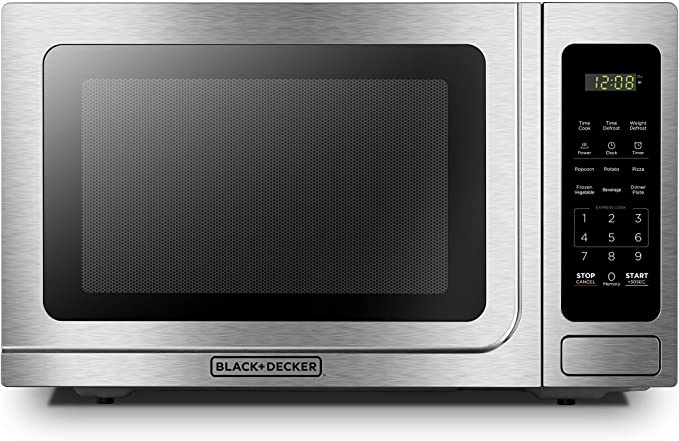
A black decker oven is another addition to the list of 12v portable microwaves. If we explain the term in simple words then it means it can work perfectly at the voltage of only 12 volts.
Furthermore, there is pre-installation of programs for heating and cooking different sorts of food and edible food. Food includes potatoes, pizza, frozen items, etc.
Additionally for the snappier and perfect performance operate it on 1000 watts. On these watts, it ultimately provides you with 10 power settings. Moreover, you can also be provided with a clock and kitchen timer. Surprisingly it starts quickly in only thirty seconds.
When we talk about its functions and working, it works with the push button system. Simply push its button and the door will open. The button is super soft, you have to gently push it and it will open.
Furthermore, its turntable size is 12.4 inches. It means you can also use it for medium to large size containers. The important thing about its turntable is that it is removable.
User Experience:
I’ve only had this product for a short time, but it’s worked well so far. It’s easy to use and easy to clean up with a microfiber towel. The display had a plastic coating that I had to peel off, which was a bit difficult. At first, I thought the display was just dull, but I finally got it going and pulled the coating off.
Features:
- This microwave comes with pre-installed programs.
- Automatic temperature controller.
- Work with push-button function.
- Works at 12 volts
Toshiba Oven With Smart Sensor:
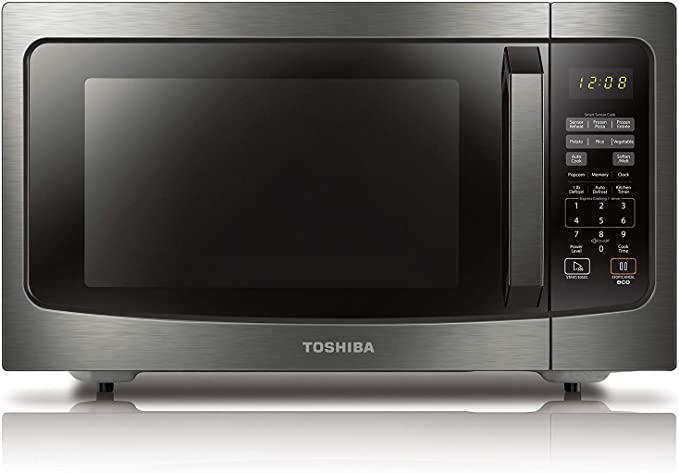
It is the most advanced and latest model of the Toshiba brand. Ultimately all the functions and features of this product are unique and flawless. It is a high-power microwave that operates at 1200 watts.
Furthermore, this can provide you with 10 power levels. The most crucial feature of this product is its pre-programmed sensor menu.
Ultimately this pre-programmed sensor provides optimum heating to every sort of food. This food may be veggies or meat or it might be junk food as well.
Its size is perfect to place in small spaces. As it comes with a 1.6 cubic foot capacity. Additionally, it comes with an advanced ECO mode along with an energy-saving mode.
Ultimately it tends to save power and electricity to save for future generations.
User Experience:
I’m really happy with my new microwave! It has a lot of features that my old one didn’t have, and it’s a lot easier to use once you get used to it. The different defrost powers are really handy, and it heats up food really evenly.
Features:
- There are position memory techniques for perfect working.
- Its sleek and modern look makes it eye-catching.
- Pre-programmed sensors
Nostalgia Programed Cooking Oven:
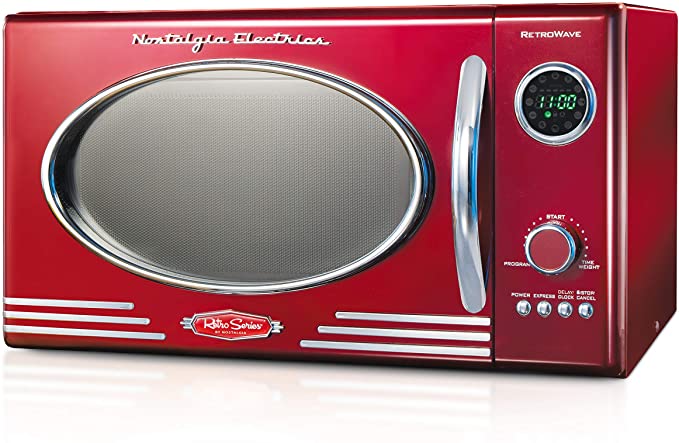
Nostalgia warmer is perfect to use as a car microwave. The best thing about this product is that it can work only with 800 watts of cooking power. So you do not need to supply it with a high power like 1200 watts. You can also place it in cars and use it during journeys as well.
To make it more portable it was designed with only 9.0 cubic feet. Ultimately you can easily take it with you whenever you want. Additionally, you can also take advantage of it by using it as a domestic oven.
Furthermore, it gives evenly heat in every direction of food. No need to worry about overheating or drying food. This automatic oven adjusts heat according to food capacity.
There are 12 pre-programmed settings. Ultimately you can cook and reheat almost every sort of food. It provides equal results on full frozen foods as well. It is very easy to operate due to its dial pad. Even beginners or children can also command it easily.
User Experience:
We are really enjoying this microwave. It was a great purchase to make to help us out when our over stove built-in failed on New Year’s Eve. I love how it doesn’t take up any counter space and it really enhances the look of the kitchen.
Features:
- Works with 800-watt cooking power
- Comes with a pre-installed function for food and cooking flexibility
- A removable turntable gives easier cleaning
Portable Oven For Home Kitchen:
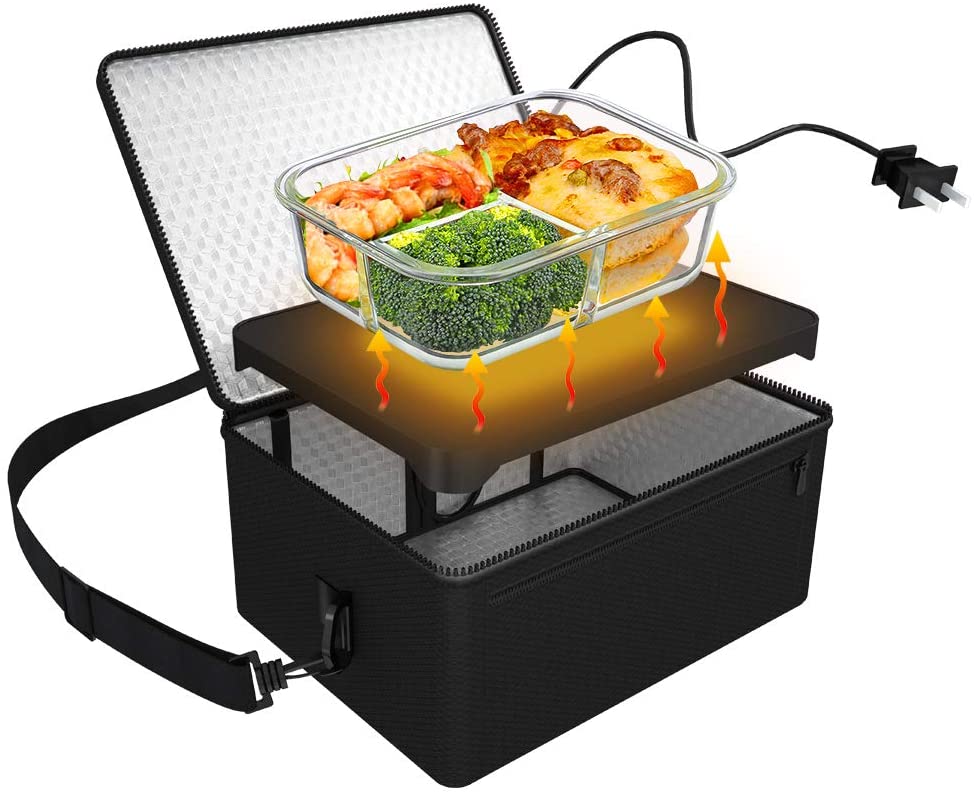
This mini portable microwave oven is a useful gadget for home appliances. Furthermore, it comes with all the amazing and advanced features that must be in the top-rated microwaves. Additionally, it is super portable.
This microwave is famous for heating and cooking almost every sort of food irrespective it is cooked or frozen.
Furthermore, unlike other cheap ovens, this oven keeps food flavorful and fresh. Additionally, it will not burn or dry the water content of the food. Ultimately keeps the original taste of the food.
Secondly, this gadget is very convenient to use. The reason behind this is its automatic temperature controls.
Additionally, this feature does not allow overheating. Ultimately you just need to plug it and set the timer and engage yourself with some other stuff. It means you are not stuck standing in front of it.
Furthermore, you can easily take it with you without any trouble. Keep it in a bag and place it in the car and that’s all. For efficient processing keep it in a flat and heat resistant container.
User Experience:
If you’re looking for an alternative to a dirty office microwave, this mini personal fridge is a great option. It’s small, so it won’t take up a lot of space on your desk, and it heats up food quickly and evenly. The fridge is also very easy to keep clean, which is a major plus for me.
Features:
- Mini size oven to increase its portability.
- Its automatic controllers tend to give easier working
- There is a need for a specific heat-resistant container for proper working.
Max Burton Lightweight Oven:
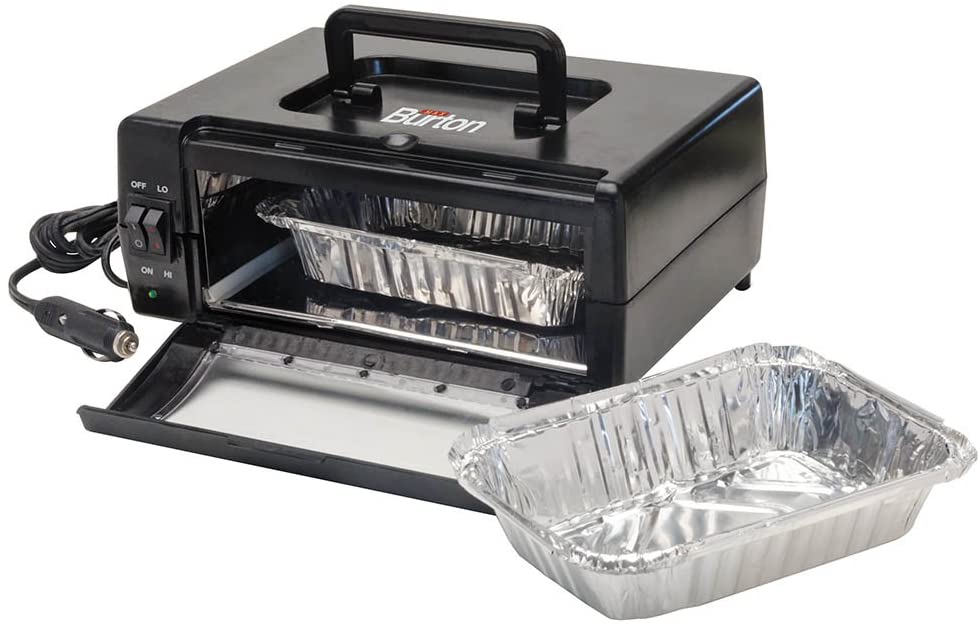
Max Burton oven design by using the latest technology. Ultimately it is no mistake to say it is the most advanced product on the whole list of the best portable microwave.
The main requirement to run this product is that you must have a 12 to 14 volts DC voltage. And the main limitation of this is that it does not work properly by using an AC source. If you want to get an efficient result connect it with a DC source.
Additionally, the supply ranges from 120 watts to 130 watts. The power supply above or below this range will affect the output of this gadget. Furthermore, the warmer air is compact.
Generally, it does not occupy much space and it will perfectly adjust in very limited space.
User Experience:
This portable oven is perfect for on the road. My husband uses it in his truck to cook and heat up meals. The best part is that it doesn’t take up a lot of space and is very easy to use. The toaster function is also a great addition. Highly recommend it.
Features:
- It is equipped with a dual heating element.
- There is an ON and OFF switch as well.
- An automatic temperature control panel is also present.
Hot Logic Mini Portable Stove:
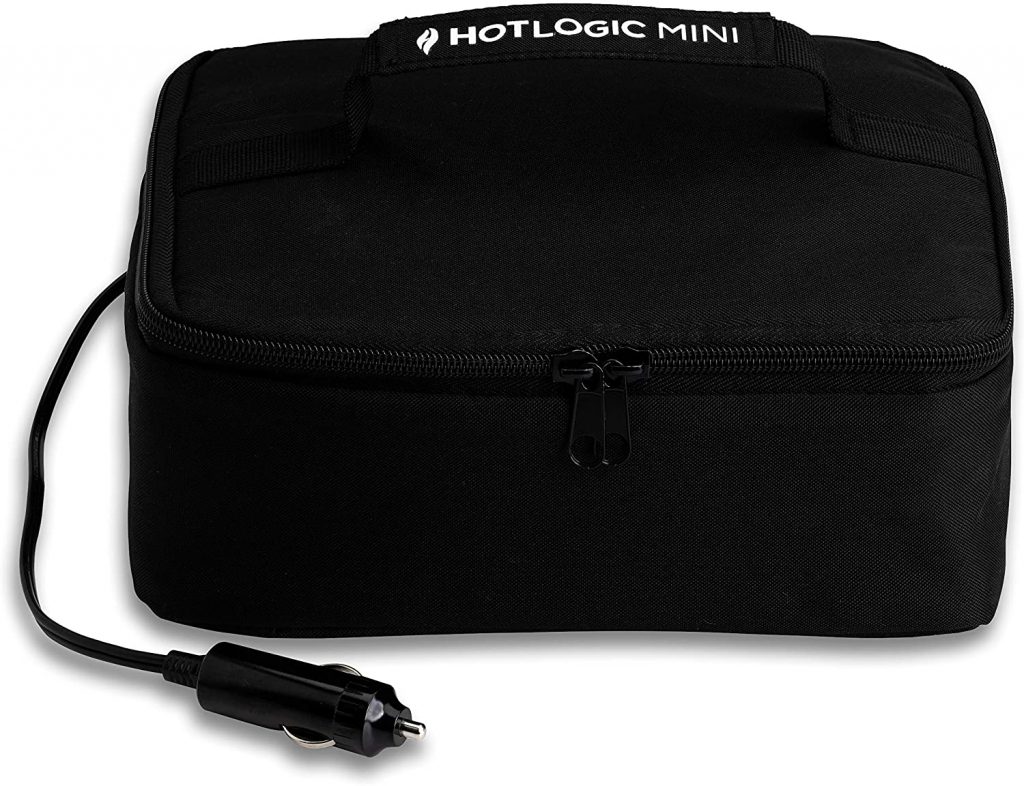
The most innovative and unique oven that is currently present on the market is the hot logic mini warmer. Indeed perfect for cooking food.
Moreover, It is one of the best devices for cooking healthy dishes, and heating frozen boxed food. And for rewarming of already cooked food when you are driving. It is equally beneficial for you whether you are busy with carpooling, driver, delivery person, or business traveler.
The interesting and best thing about this oven is that it can even cook and rewarm fresh or frozen food without any complexity.
Furthermore, we guarantee that it will not burn or dry your food. Additionally, it keeps your food flavorful and fresh. Moreover, there is no need to monitor it during its whole work. Simply set time and sum up your other task.
User Experience:
If you’re looking for an easy way to eat healthier on the road, this is the perfect solution! The food stays warm and there’s no need to stop at greasy truck stops. This has really helped me slim down and feel better overall.
Features:
- It weighs very low only 1.15 pounds
- Works compatibility with flat-bottom containers of glass plastic or aluminum foil.
WINIA Microwave Sleek And Stylish:
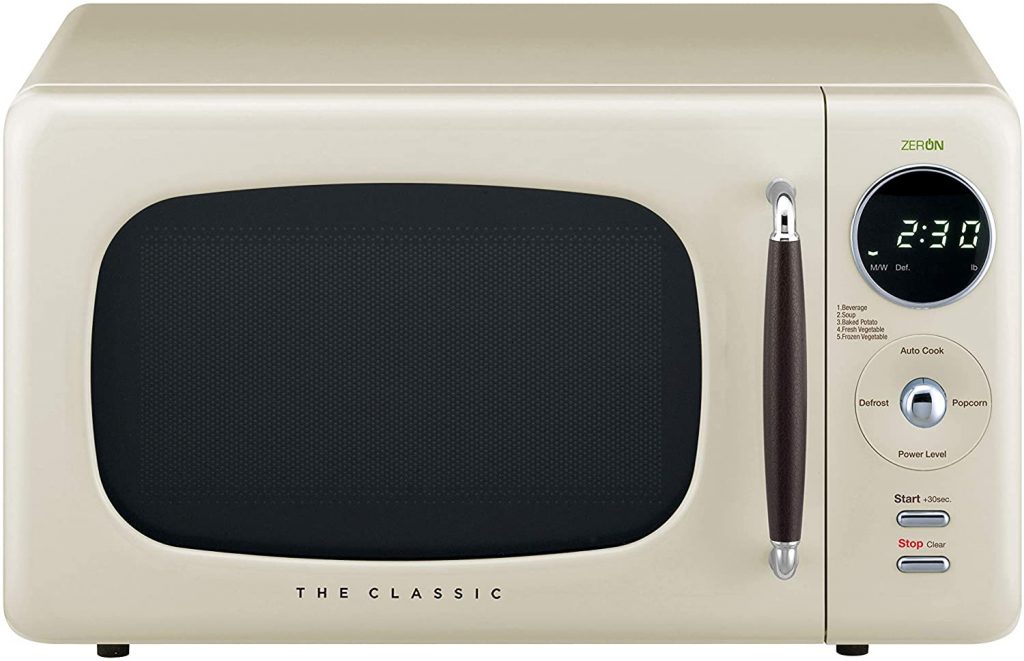
The super vintage and aesthetic design of WINIA microwaves attract your attention itself very easily. It is not wrong to say it is indeed efficient in the working and classy with respect to its looks.
It defeated a new and modern-looking oven with a fine and antique look. With the dual waves technology and CRS (concave reflex system), it tends to give splendid output. This feature allows you to cook uncooked food properly and reheat the cooked food without drying.
Furthermore, it is one of the top-rated portable microwaves as it utilizes energy only when you are using it. Otherwise, it tends to save as much energy as it can.
User Experience:
I’m very happy with my purchase of this small, retro-looking microwave. It works well and the 30-second button is great for heating up my tea or coffee. The only thing I miss is having a clock on my microwave.
Features:
- Comes with an aesthetic and vintage retro design.
- Its CRS technology gives flawless and efficient results.
- With its recessed turntable, it tends to provide more space as compared to the traditional ones.
Toshiba ECO Mode Portable Oven:
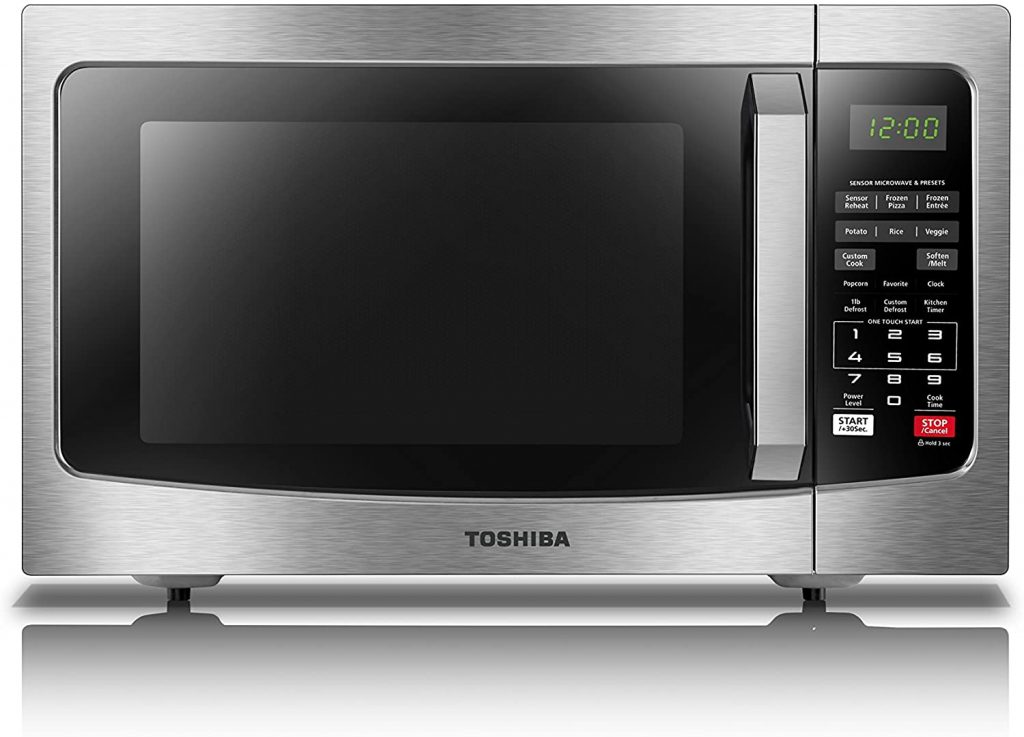
Now it’s time to review another best model of the Toshiba brand. Start from its cleaning process. With its removable turntable, it makes the cleaning process very easy and snappier.
Simply remove the plate and clean its interior with proper detergent. Furthermore its outer dimension is 20.5 x 17.1 x 12.8 inches and internal dimension is 13.07 x 15 x 9.5 inches.
You do not need to worry about its programming. The reason behind this is the oven comes with a pre-programmed sensor menu. Ultimately it gives optimum heating of almost all sorts of foods whether it is frozen or unfrozen.
User Experience:
I’m really happy with my new Toshiba microwave! It works great and looks really good too. The stainless steel finish is really nice and the black semi-gloss cabinet looks great with the stainless steel accents. It’s a bit on the heavy side but that’s to be expected with a 1.2 cu ft microwave.
Features:
- Sleek and stainless shock-resistant body
- Pre-programmed sensor menu for quick working
- Large turntable size of 12.4 inches
ZLINE Portable Microwave With Removable Turntable:
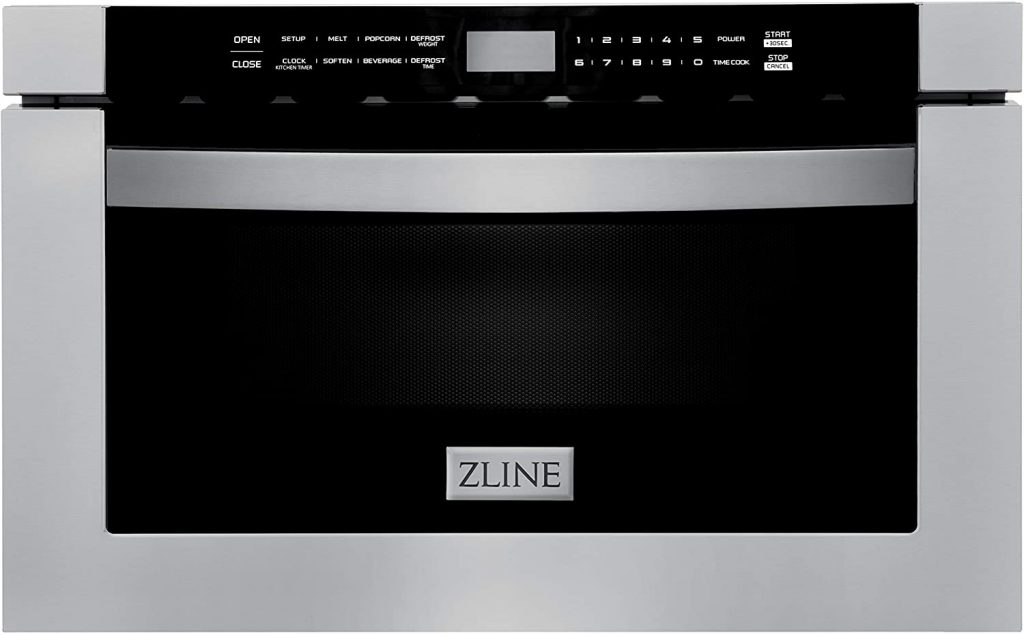
To provide maximum flexibility in foods and cooking, the ZLINE oven comes with 11 power levels. Ultimately you can easily enjoy almost every sort of warming and reheating of foods. There is no differentiation in results between cooked and uncooked food.
Furthermore, to make this device easy to use for beginner chefs and children it is designed with a single touch panel. Simply give it a command by simply touching and panel and all done.
There is a proper system to prevent overheating. Additionally, it is safe for melting butter, marshmallows, chocolate, and cheese as well. Moreover, it works in the range of 120 volts with a power supply of 60 Hz.
User Experience:
I absolutely love this microwave! It’s so handy to have a microwave in a drawer, below the waist instead of above the shoulders. It is much safer not having to lift hot items from a higher location. This has been a game-changer for me and I would highly recommend it to anyone!
Features:
- Works with 11 power levels for the flexibility of cooking
- Easier to use with a one-touch panel
- Works with DC source.
Breville Smooth Wave Oven:
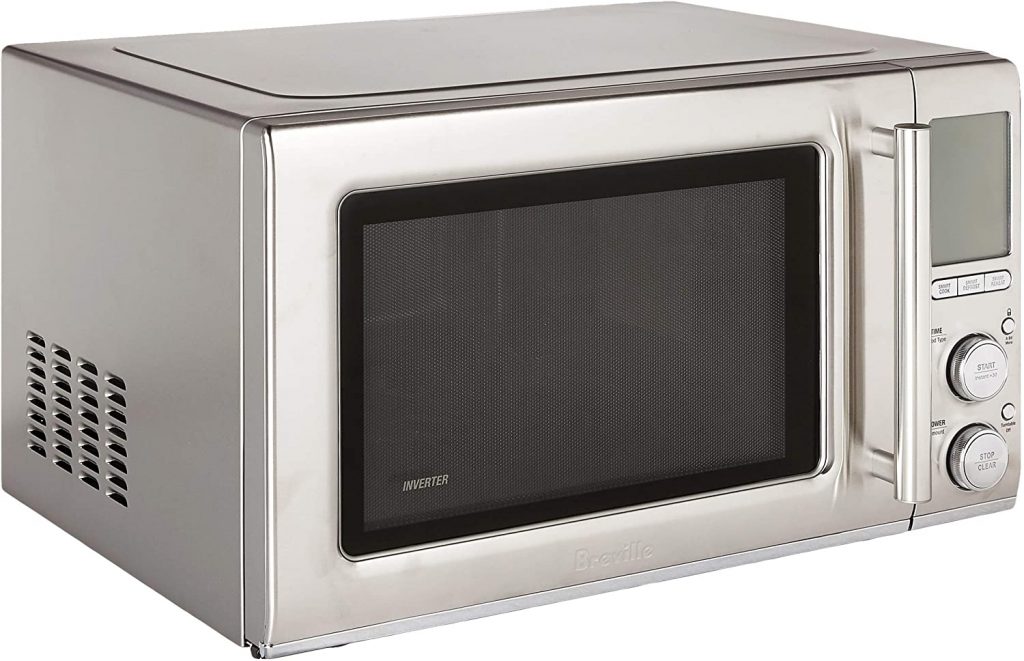
Moving toward the review of Breville’s smooth portable microwave, starting from its latest feature of the guesswork out of cooking. It works flawlessly with its sensor IQ technology.
The interesting thing about this oven is that it works automatically without any concern from people. You just have to give it a command and leave it. After reheating the things it starts buzzing to indicate that the function has been completed.
Another best feature of this portable microwave Walmart is its power smoothing inverter. Unlike manual warmers there is no worry of overheating, burning, and dryness of food.
This efficient product adjusts everything according to the requirement of food. Moreover, it keeps the food flavor unchanged. For the safety concern, there is a smart child lock as well.
User Experience:
This is the perfect solution for my husband who works in construction and doesn’t always have access to a microwave. He’s very happy with it and I haven’t heard any complaints so far.
Features:
- The latest and innovative sensor IQ technology is also present for flawless results.
- Perfect for both reheating or cooking of food
- One-touch auto setting
Personal Food Warmer Portable Heated Oven:
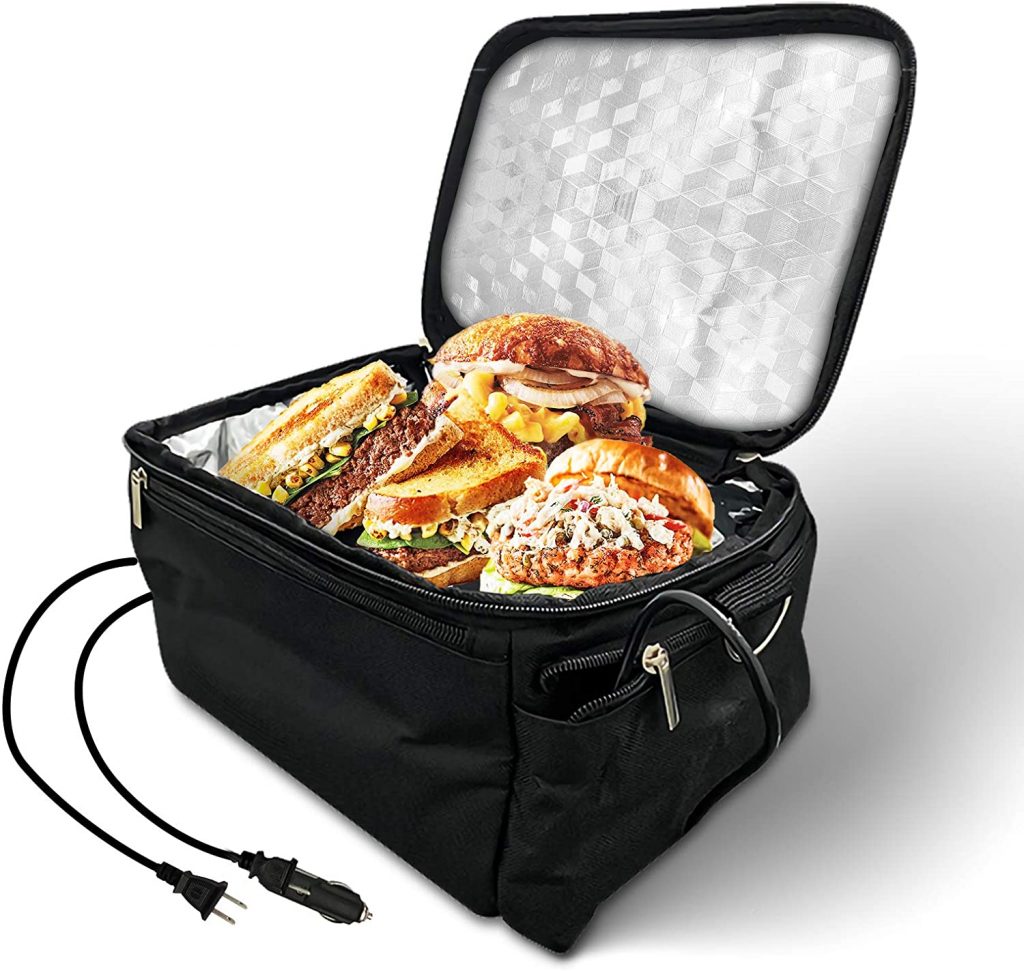
Most people are looking for a personal use oven that works fine for a single person. For such searchers, this personal food warmer is no less than a miracle.
An interesting fact about this product is that it is equally beneficial for the cooking of raw food, and reheating of cooked food. Additionally, it works slowly but efficiently. There is no dial-up or buttons for command.
Additionally, it comes with two different heating plates of 110 volts and 220 volts. Ultimately this feature makes it a perfect gadget for picnics, offices, or cars as well.
The main reason behind this is that it is small and very portable. Furthermore, it is designed with poly canvas material that is environmentally friendly as well as strong to increase its working life.
User Experience:
I was so tired of waiting for the microwave at work, so I decided to buy my own. It was a great decision! This microwave works great and heats up my food quickly. I’m so happy I made this purchase.
Features:
- Two heating plates of 12/V110-220V are present.
- Perfect for picnics, offices, or cars due to its size and design.
- The automatic temperature control system is present.
Portable Oven Best For Offices:
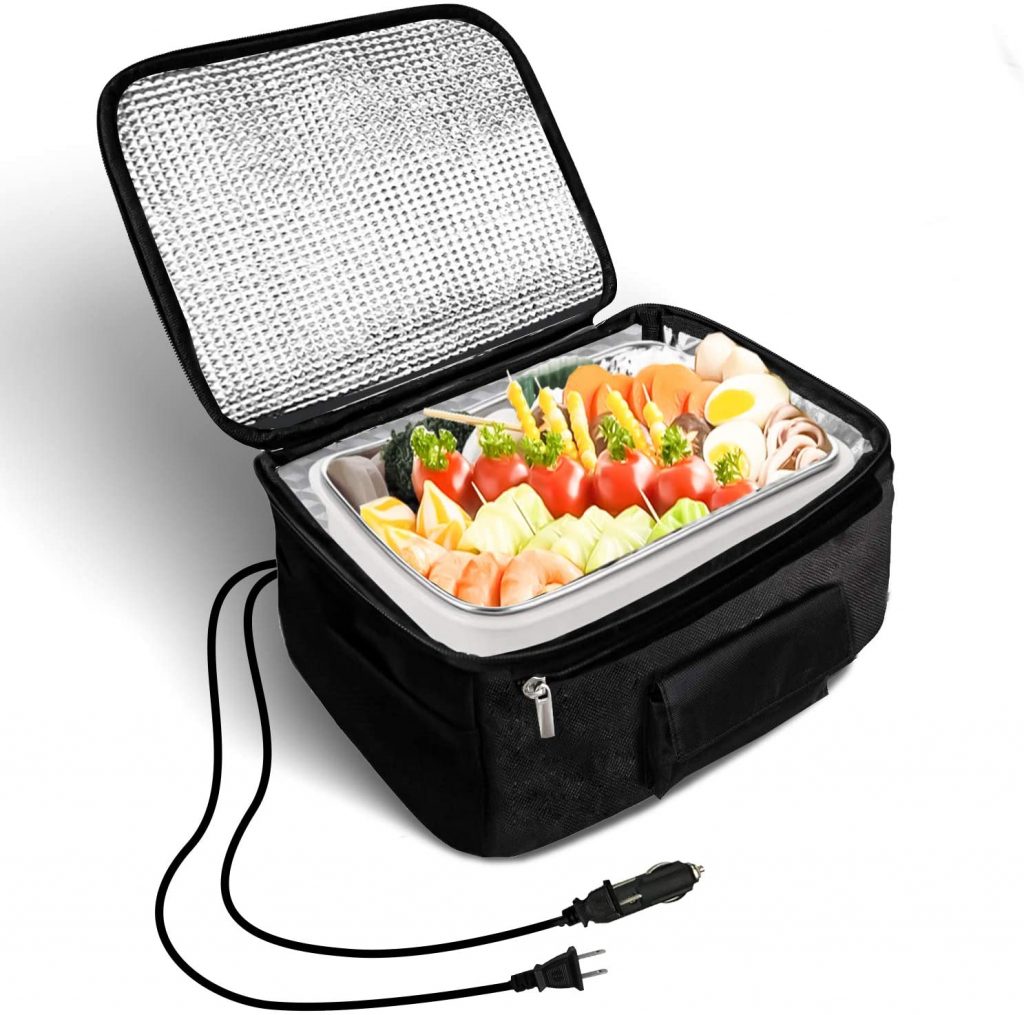
If you are looking for an office, use an oven for a long time then no need to search anymore. Go and pick this portable microwave. As it comes with two heating plates for the even heating of cooked food and proper cooking of raw food.
Moreover, unlike an ordinary warmer, this oven will help you to cook raw food properly. Additionally, it reheats frozen food efficiently without drying or burning it.
Moreover, the water content remains the same as present in fresh food. When talking about its size, it comes in at 11 inches x 8 inches x 3.5 inches. Surprisingly mini and compatible to carry.
User Experience:
I’m really happy with my new microwave! It has a lot of features that my old one didn’t have, and it’s a lot easier to use once you get used to it. The different defrost powers are really handy, and it heats up food really evenly.
Features:
- Automatic temperature controller to prevent overheating.
- Mini-sized portable microwave
- It is equipped with two heating plates.
Final Words:
That is all about the portable microwave. We tried to provide you with maximum information about top ovens with their honest reviews. All of the mentioned mini ovens are portable and versatile. You can pick one from you if you want without any regret.
Furthermore, before making any decision about the warmer you must clearly know about the requirements of your task.
You should know whether you are buying a microwave for cooking raw food or for reheating food or may you be searching for both things. We suggest you not buy any product due to its fancy looks only.
Furthermore, if you still have any queries related to the microwaves. You are free to ask in the comment section. Moreover, there is still confusion related to reviews of products. Make sure to read the article once more with proper attention. We wish you the best of luck!!!
Frequently asked questions (FAQS):
Q1) Can we place microwaves in our bedrooms? Is it safe?
Normally a bedroom does not have space to keep cooking or heating accessories. Keeping cooking accessories in rooms might be dangerous sometimes. In the case of a portable microwave, a coffee maker, or a kettle are crucial and useful accessories for cooking and reheating.
Furthermore, these things are harmless, if they talk especially for microwaves then there are temperature controllers inside them that protect against overheating and all. So you surely keep microwaves inside your bedroom if you have spare space in the room and instantly enjoy fresh and proper heated food.
Q2) What are the limitations of microwaves? What things you can not put in microwaves?
like every electric gadget, portable microwaves also have some limitations. Unfortunately, if you keep anything that is not supported by microwaves then you may disturb working on it.
In some cases, microwave circuits stop working. So to avoid any mishap, let’s have a look at the things that you should not keep in microwaves.
These things are aluminum foil, paper bags, plastic bags, plastic containers, travel mugs, any type of cloth, hard-boiled egg, hot papers, Styrofoam, lidless containers, etc. if you place any of the things mentioned above then you may affect your health or your device.
Q3) What things that a person should notice while buying a manual food warmer or a portable microwave?
when any person is going to buy a microwave then there are some features that should not be neglected. Unfortunately if one should forget to note them then it may become a loss of money for himself.
Moreover, if you note all the below-mentioned factors before making any choice then it is obvious cooking or reheating becomes fun for you.
The first and most important space of your kitchen secondly is the size of the microwave, its wattage, and reliability. Additionally, your budget and the price of microwaves should be compatible. After that note, it is working and performance, noise, ventilation, and finally safety.
Q4) What is the maximum life of any microwave oven?
The life of any machinery depends upon its maintenance and care. More maintenance the longer the life. Typically the average life of an oven is seven years.
Furthermore, if you take great care of it, it can last for nine to ten years. On the other hand, if you overuse it, and do not take care of it, its working life automatically decreases. So it is suggested by experts not to use an oven for more than 6 hours in a whole day.
Q5) What are the ground rules to use microwaves? How to use microwaves correctly?
There are some important rules to operating microwaves correctly. These steps are given below
- Do not need to put metal ware in microwaves
- Microwaves are not good for recipes that require a lot of water while cooking.
- Before placing food in microwaves arrange it so that it cooks evenly,
- Always place the cover over the container.
- Keep staring at food after equal intervals for best results.
- The food size should be small.

